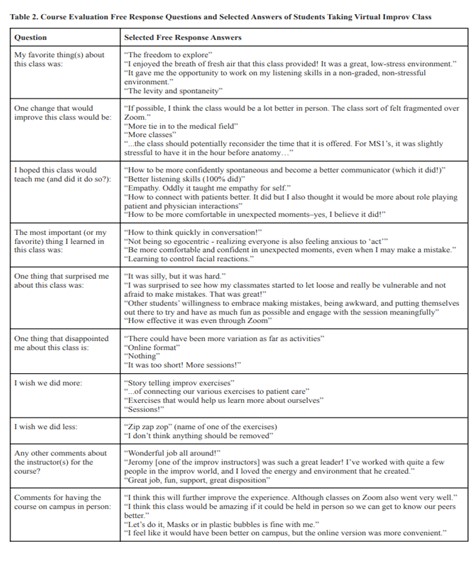Medical Education: Medical Student
Category: Abstract Submission
Medical Education 9 - Medical Education: Resident II
244 - Feasibility and Acceptability of a Virtual Improvisation Course for Medical Students
Sunday, April 24, 2022
3:30 PM - 6:00 PM US MT
Poster Number: 244
Publication Number: 244.333
Publication Number: 244.333
Katie K. Tran, UT Health Houston/McGovern Medical School, Houston, TX, United States; Michelle S. Barratt, McGovern Medical School at the University of Texas Health Science Center at Houston, Houston, TX, United States
- KT
Katie K. Tran, MD MPH
Assistant Professor of Pediatrics
UT Health Houston/McGovern Medical School
Houston, Texas, United States
Presenting Author(s)
Background: Communication skills and integration of the arts are important aspects in medical training. Improvisation (improv) incorporates both of these elements and has been introduced at medical schools as an adjunct to training in communication to increase situational awareness and confidence in navigating new situations. A new fall 2021 elective at McGovern Medical School at UTHealth paired the skills of improv professional artists with the medical expertise and examples of professional encounters of the authors. Due to the COVID-19 pandemic and Delta variant spike, the elective was required to be virtual.
Objective: The objectives were to assess the feasibility and acceptability of a virtual improvisation course for 1st and 2nd year medical students.
Design/Methods: Nineteen students enrolled in the 6 session course, which was split into 2 groups to provide more opportunities for individual participation. Attendance in at least 5 of 6 sessions were required for course credit. Each group had one improv professional artist and one of the authors. Sessions were held virtually via Zoom. An anonymous online course evaluation (that included questions in a 5-point Likert scale, free response, and discrete answer format) was provided after the last session and analyzed in a mixed method approach.
Results: Seventeen students (89%) attended 5 or more sessions and completed the evaluation. Students overall had little experience with improv (from scale of 0 to 100, range = 0-75; mean= 24) before the course and reported strong interest in continued improv opportunities after the course (range = 23-100; mean 76). 94% strongly agreed that the course helped them be more observant, respond in the moment, be a more flexible and resourceful person, and that studying improv could make them a better doctor. 94% of students either agreed or strongly agreed that the course increased their confidence, became a better team member/collaborator, grew their empathy for others, and would recommend the class to other students. 100% students would attend this course if it was only offered in-person. Suggestions for improvement included considering scheduling around exams and classes, in-person format, and more sessions (see Table 2).Conclusion(s): The virtual improv course was both feasible and acceptable by student report. Students noted that it helped them be more observant, become better listeners, and believed that studying improv could make them a better doctor. Considerations for future courses include offering them in-person at convenient times and having more and/or longer sessions.
Table 1. Anonymous Course Evaluation of Students Taking Virtual Improv Class.jpg) Likert scale questions included in survey.
Likert scale questions included in survey.
Table 2. Course Evaluation Free Response Questions and Selected Answers of Students Taking Virtual Improv Class
Objective: The objectives were to assess the feasibility and acceptability of a virtual improvisation course for 1st and 2nd year medical students.
Design/Methods: Nineteen students enrolled in the 6 session course, which was split into 2 groups to provide more opportunities for individual participation. Attendance in at least 5 of 6 sessions were required for course credit. Each group had one improv professional artist and one of the authors. Sessions were held virtually via Zoom. An anonymous online course evaluation (that included questions in a 5-point Likert scale, free response, and discrete answer format) was provided after the last session and analyzed in a mixed method approach.
Results: Seventeen students (89%) attended 5 or more sessions and completed the evaluation. Students overall had little experience with improv (from scale of 0 to 100, range = 0-75; mean= 24) before the course and reported strong interest in continued improv opportunities after the course (range = 23-100; mean 76). 94% strongly agreed that the course helped them be more observant, respond in the moment, be a more flexible and resourceful person, and that studying improv could make them a better doctor. 94% of students either agreed or strongly agreed that the course increased their confidence, became a better team member/collaborator, grew their empathy for others, and would recommend the class to other students. 100% students would attend this course if it was only offered in-person. Suggestions for improvement included considering scheduling around exams and classes, in-person format, and more sessions (see Table 2).Conclusion(s): The virtual improv course was both feasible and acceptable by student report. Students noted that it helped them be more observant, become better listeners, and believed that studying improv could make them a better doctor. Considerations for future courses include offering them in-person at convenient times and having more and/or longer sessions.
Table 1. Anonymous Course Evaluation of Students Taking Virtual Improv Class
.jpg) Likert scale questions included in survey.
Likert scale questions included in survey.Table 2. Course Evaluation Free Response Questions and Selected Answers of Students Taking Virtual Improv Class

